
Related
Guests
- Molly MolloyLatin American specialist focused on border issues and co-editor of the new book El Sicario: The Autobiography of a Mexican Assassin, about the hidden face of America’s war on drugs.
A march against the U.S.-backed war on drugs drew 20,000 people into the streets of Mexico City on Sunday, calling attention to the country’s gruesome drug war-related violence that has claimed more than 38,000 lives since Mexican President Felipe Calderón launched the campaign against drug traffickers and cartels in 2006. Congress has appropriated $1.5 billion for Mexico’s drug war since 2008. The march began in the central Mexican state of Morelos, led by the Mexican poet Javier Sicilia, whose 24-year-old son was killed by gunmen earlier this year. We speak with Molly Molloy, an expert on the drug war and U.S.-Mexican border issues, and co-editor of the new book El Sicario: The Autobiography of a Mexican Assassin. “I believe it’s a war on the Mexican people, carried out by the Mexican government,” Molloy says. [includes rush transcript]
Transcript
AMY GOODMAN: A march against the U.S.-backed war on drugs drew 20,000 people into the streets of Mexico City Sunday and called attention to the country’s gruesome drug war violence that’s claimed more than — what is it? — something like 38,000 lives since 2006. The march began in the central Mexican state of Morelos, led by the Mexican poet Javier Sicilia, whose 24-year-old son was killed by gunmen earlier this year. When it arrived in Mexico City’s Zócalo Sunday, Sicilia addressed the crowd.
JAVIER SICILIA: [translated] We’re here to tell ourselves and them that we will not turn this pain in our souls, in our bodies, in hate nor in more violence, but in a vehicle to help us restore love, peace, justice, dignity and the stuttering democracy that we’re losing, to tell ourselves and to tell them that even though we believe that the country will be reborn, will come out of its ruins to show the men of death that we’re on our feet and that we won’t stop defending the lives of all the sons and daughters in this country, that we still believe that it’s possible to rescue and reconstruct the social fabric of our peoples, neighborhoods and cities.
AMY GOODMAN: That was Mexican poet Javier Sicilia. He’s stopped writing poetry since his son’s death. The overwhelming number of people who die in this so-called war on drugs are civilians. It’s become a war on civilians, Molly Molloy. Talk about the significance of this and what you think needs to happen.
MOLLY MOLLOY: It’s absolutely a war on civilians. There’s no doubt in my mind that the majority of people killed are ordinary poor people, not even people at the level of affluence of Javier Sicilia’s family, probably, but rather people that live in a very marginal way, by our standards in the United States, but people that are really the backbone of society in many Mexican cities.
One thing that’s interesting to note is that in Ciudad Juárez, the Mexican border city that is only about 40 miles from where I’m sitting in my house in Las Cruces, in Ciudad Juárez, more than 8,500 people have been killed since the beginning of Calderón’s supposed war on drugs. This is about a fourth or fifth, somewhere in that neighborhood, of the number of people killed in the whole country of Mexico. And Ciudad Juárez is not a very large city. It’s about 1.3 million people, about the size of Philadelphia or San Antonio. So, Juárez has borne the overwhelming burden of people murdered in this terrifying violent war, which I believe is a war on the Mexican people carried out by the Mexican government. And sadly, many U.S. tax dollars are going to support the Mexican military and the Mexican security forces. And it’s terrifying to know that our money is being used to kill a lot of innocent people.
AMY GOODMAN: What about the issue, Molly, of legalization? Talk about the significance of the past and present Mexican presidents, conservative or not, calling for this.
MOLLY MOLLOY: Right. Well, legalization of drugs is something that has been proposed. And I think, in the long term, it is probably the only thing that can undo the terrifying system of violence in Mexico related to the drug business, because what illegal drugs really are is a huge business in Mexico. It’s a huge part of the Mexican economy. And many people there are dependent on the dollars that are earned from the drug business at all levels, at street level in cities like Juárez and at the national level, because the money generated by drugs, it doesn’t stay illegal for long. It is almost immediately absorbed into the banking systems of not only Mexico, but the United States and the world economy. There’s a lot of evidence as to the international monetary system laundering billions of dollars every single year, that is generated by this terribly violent business in Mexico and in other countries in Latin America and Central America. So legalization is something that, in the long run, I think will take a lot of the money out of this war, this economy, whatever we would like to call it.
Sadly, in the short term, legalization is not going to stop the violence, because these — many governments in Central America and in Mexico have evolved into basically a network of criminal gangs that manage a lot of illegal businesses, not only drugs, but also kidnapping, extortion, arms trade, human trafficking, these kinds of trades. And these things will not be stopped overnight. This is an entrenched system in Mexico. And actually, the book that you mentioned about the life story of a sicario, a Mexican criminal, killer, who worked for the drug business, he was also a member of the state police in the state of Chihuahua. And according to his testimony, the drug cartels, the drug trafficking organizations, have infiltrated every level of the Mexican government. And there are many, many more people like him.
AMY GOODMAN: And, of course, the United States has appropriated something like $1.5 billion for Mexico in the so-called war on drugs just in the last few years.
MOLLY MOLLOY: That’s correct. And as far as I can tell, most of the money is going to the Mexican military, to various entities within the military, providing equipment, providing security assistance, surveillance, even drone aircraft to take out certain targets. But sadly, the violence is only getting worse. The violence has increased exponentially since 2006, December 2006, when Calderón took office in Mexico. And actually, the Mexican press reported — and it was barely echoed in the U.S. press — that April 2011 was the most violent month so far since the beginning of the Calderón administration: over 1,400 people killed nationwide during just one month. And the death toll, according to many estimates from human rights groups and others, is that the death toll in Mexico is actually probably closer to 40,000 to 45,000 people killed in only four years. This is an extraordinary death toll that really is not fully —- I don’t think the American people are fully aware of the violence so close to us in Mexico. And it’s not something that is readily known. We see the extreme examples of things that are going on, but we don’t see in our press the daily death toll. Seven -—
AMY GOODMAN: Molly Molloy, I want to thank you for being with us. And I think you were just about to say this, but yesterday seven people alone in Juárez died. That’s just one day in one city in Mexico. Molly, thanks so much for being with us from Las Cruces, New Mexico, a Latin American specialist focusing on border issues, co-editor of the book El Sicario: The Autobiography of a Mexican Assassin. I want to also thank Ali Noorani, executive director of the National Immigration Forum in Washington, D.C., and Sunita Patel here in New York, from the Center for Constitutional Rights.

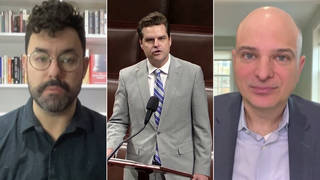
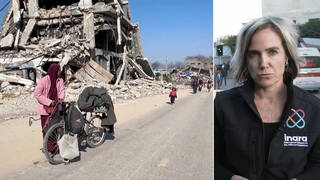
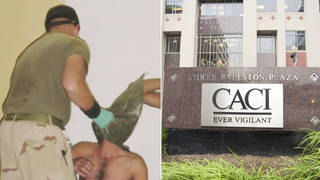
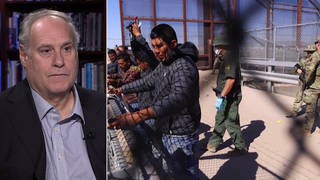





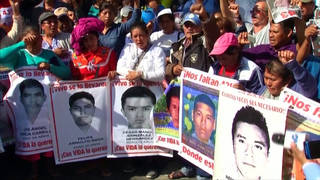
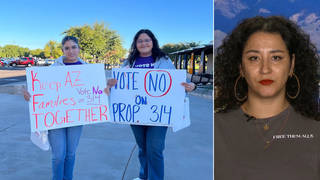
Media Options